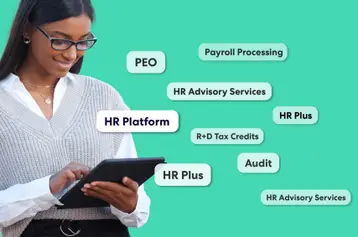Understanding the PEO Service Agreement Essentials

Table of contents
- 1.What Is a PEO Service Agreement?
- 2.Key Terms of PEO Service Agreements?
- 3.Services
- 4.Technology
- 5.Pricing and Invoicing
- 6.Confidentiality
- 7.Required
- 8.Termination
- 9.Miscellaneous
- 10.Expert Services
A professional employer organization (PEO) provides outsourced human resources administrative services, usually to small and medium-sized businesses. A PEO offers much-needed help to companies that need HR assistance and may not have the resources for a full-scale HR department.
A PEO and the client company enter into a contractual agreement known as a co-employment arrangement. This agreement outlines the roles and responsibilities between the parties. Through this model, the PEO provides economies of scale, help with cost efficiency, and access to big-company benefits. It also offers HR expertise to support compliance with employment-related rules and requirement, while providing best practice guidance on complex HR concerns to help small and medium-sized companies stay informed and up-to-date.
The typical outsourcing services a PEO provides for its clients include:
- Payroll services
- Payroll tax administration
- Risk mitigation
- HR technology system
- Access to benefits and benefits administration
- Workers’ compensation administration
PEOs can provide comprehensive services, freeing companies time and resources spent on HR administration. This helps companies better focus on their core competencies and business goals.
What Is a PEO Service Agreement?
A PEO service agreement (also called a PEO client service agreement) is an agreement that details the service terms between the PEO and client company that are entering into a co-employment relationship.
The agreement covers a lot of ground. The agreement should clearly define the roles and responsibilities of both the client company and the PEO, as well as outline the parties’ expectations for the services and obligations.
PEO service agreement typically includes:
- The parties’ responsibilities
- Fee terms
- Services
- How to exit an agreement
- Confidentiality
- Data
A well-drafted PEO service agreement typically includes any regulatory obligations and how they are handled, while also providing guidance for handling and managing conflicts between the client company and PEO. This can help the parties mitigate disputes. It can also provide the groundwork for a smoothly running strategic relationship.
You should consider reviewing the contract with any relevant advisors or business units. This will help align your expectations. Afterward, collaborate with the PEO to negotiate the contract in a way that supports a strong and productive strategic relationship.
Key Terms of PEO Service Agreements?
Here's a look at some key terms that you may see in a PEO service agreement.
Services
The agreement is typically expected to outline the scope of the services the PEO will provide to the client company. Detailed descriptions of the services will help describe and set expectations about the services. In addition, the agreement may outline the responsibility of the client company with these services.
Technology
If the PEO provides an HR technology platform, this section may outline specific requirements and obligations related to its use. It may also include information about how client company data, including employee data, is stored within the platform.
Pricing and Invoicing
The agreement may include the payment terms. It may also detail when and how the payment should be made to the PEO.
Additionally, the agreement typically outlines how the PEO price its services — whether that is per-employee basis, as a percentage of payroll, or through a combination of the two. The agreement may also detail if the fees for the PEO’s services are bundled or unbundled. There may be a detailed breakdown that shows line-item costs for service and any other specific details
Confidentiality
Much of the employee data is sensitive and personal. For example, the PEO may have access to employees’ pay information, Social Security numbers, addresses, phone numbers, and health insurance information. The PEO may also have access to other sensitive business information. The client company may also have access to sensitive information provided by the PEO too. It’s crucial that all sensitive information be kept confidential. The agreement should specify that both parties are responsible for maintaining confidentiality.
Required
The agreement may include specific terms required by law or regulation. Additionally, due to the co-employment relationship, it should clearly define each party’s responsibilities regarding payroll, payroll taxes, benefits, and other key employment-related obligations.
Termination
Circumstances and needs may change, and at some point, you may wish to not renew the agreement. The agreement should provide for information on how to not renew you services with the PEO and or reasons a party may terminate the agreement. A well-drafted termination section will provide the groundwork for a smooth transition and is clear. Provisions of a termination clause may include how much notice is required, how the return of confidential materials will be handled, and any financial obligations.
Miscellaneous
The agreement may also include terms covering dispute resolution, breaches of terms in the agreement, and instructions on where a party should send notices to the other party.
Expert Services
TriNet’s PEO services provide a comprehensive HR solution, refined and enhanced for more than 30 years, for your human resources needs. We make it easy by providing readily accessed HR support for you and your employees. We offer cutting-edge technology combined with personalized, expert best practice guidance.
We provide the services that small and medium-sized businesses need. These include:
- Access to comprehensive employee benefits plans that is cost-effective
- A powerful online payroll processing system that is simple to use
- Expert best practice guidance for compliance support and employment-related rules and regulations
- Solutions tailored to your industry
- User-friendly employee portals so you can manage time and the employee can view their pay and benefits informationThis communication is for informational purposes only, is not legal, tax or accounting advice, and is not an offer to sell, buy or procure insurance.
When you work with TriNet, you’ll spend less time on payroll processing, benefits administration, and other HR administrative tasks. That’s time you can use to focus on your core goals and grow your business.
Take a free and personalized HR needs assessment with our HR experts, and get a detailed review of your HR and business needs. Discover something new! Book a call today.

TriNet Team
Table of contents
- 1.What Is a PEO Service Agreement?
- 2.Key Terms of PEO Service Agreements?
- 3.Services
- 4.Technology
- 5.Pricing and Invoicing
- 6.Confidentiality
- 7.Required
- 8.Termination
- 9.Miscellaneous
- 10.Expert Services






